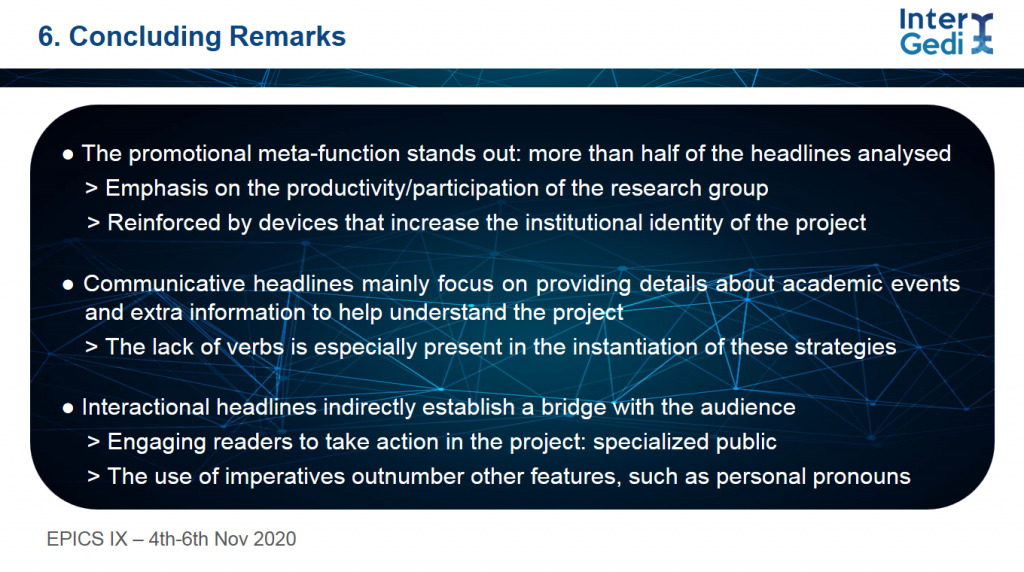EPICS IX 2020: Daniel Pascual digs into the pragmatic strategies of headlines in the section ‘news and events’ of research project websites

From 4th to 6th November, the EPICS IX, a symposium on Intercultural, Cognitive and Social Pragmatics, was held online gathering researchers from international universities to discuss their research on pragmatics and establish the current trends of analysis in the field.
Our colleague, Daniel Pascual, participated at the conference and delivered a communication on the pragmatic strategies that can be identified in the headlines of the ‘news and events’ sections that feature research project websites. There, researchers have a window to project all kinds of information about their steps and activities and a box to store experiences and findings related to the project that the user can read and consume. Moreover, he also focused on associations of those pragmatic strategies with prominent discursive realizations, to attempt to observe the specific mechanisms through which researchers construct their intention.
Here, you can read the full abstract of his proposal:
What’s the news? Pragmatic strategies in international research Project news and events headlines
International research is expanding across disciplines and institutions, especially around shared collaborative research projects. Dissemination and exploitation of project results occur mostly in digital environments like project websites. Ongoing project development is typically communicated through a section of news and events, regarded as a genre originated in social media environments and recontextualised for other professional‐related matters (Johansson, 2014). News and events sections allow research groups to account for their productivity and make them visible towards a potential heterogeneous audience of digital readers, both specialized and lay. As they are capable of shifting between linear reading and non‐linear web navigation (Askehave & Nielsen, 2005), readers’ attention needs to be strategically driven towards the project updates. This can be accomplished by offering explanatory, enticing headlines, chronologically listed in the news and events webpage, acting as a preview of the content to be accessed and conveying a purposeful pragmatic intent.
This paper intends to analyse the pragmatic strategies used in the headlines of the news and events sections of scientific international project websites, identifying researchers’ communicative intents when reporting on project progress. To that end, a corpus of 1030 news and events headlines has been compiled from 24 scientific project websites within the European program H2020, and analysed following a data‐driven taxonomy divided into three macro‐ categories of pragmatic strategies: communicative, promotional and interactional. Results indicate that, first, promotional strategies tend to outnumber communicative strategies and clearly surpass interactional ones and, second, promotional strategies show a richer variety of specific strategy instantiations than communicative ones. Thus, salient communicative strategies recurrently involve giving specific details about events and stating project technicalities, whereas promotional examples comprise highlighting member’s contribution to the project, announcing pieces of research output or claiming project milestones. Further data about the headlines reveal that the digital identity of the project is clearly emphasized over that of project members and that the preferred syntactic patterns for crafting headlines concerns non‐clausal verbal phrases. Overall, this presentation will shed light into researchers’ pragmatic practices with the aim of providing information about their project development and engaging the audience to follow updates in their project websites.
References
Askehave, I. and Nielsen, A. (2005). What are the characteristics of digital genres? ‐ Genre theory from a multi‐modal perspective. Proceedings of the 47th Hawaii International Conference on System Sciences.
Johansson, M. (2014). Reading digital news: Participation roles, activities, and positionings. Journal of Pragmatics 72, 31‐45.
